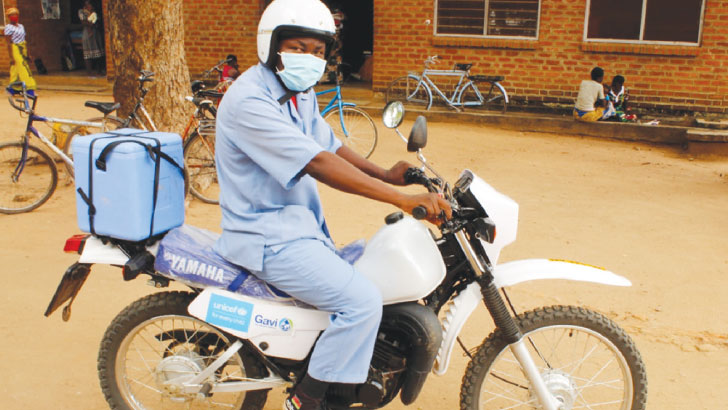Motorcycle eases reopening of clinic
As senior health surveillance assistant at Malembo Health Centre in Mangochi, Sanderson Munyonga’s work was sometimes frustrating. Mobility was challenging since he had to travel up to 25 kilometres to reach Mselema, the farthest margins of the facility’s catchment radius.
“Using a push bicycle to reach Mselema was not easy,” recalls Munyonga. “To make matters worse, there is a big river, which not passable on our bicycle.”
The management of Malembo Health Centre closed the outreach clinic for a year, denying a population of over 4 000 with 951 families access to medical care.
Boosting immunisation

Things suddenly changed in December 2020 when Unicef, with support from the Rockefeller Foundation, donated a motorcycle to Malembo Health Centre.
“The motorcycle allowed us to reopen Mselema outreach clinic in February. It helps us to deliver routine immunisation services to children in hard-to-reach areas,” he explains.
The health facility was unable to administer vaccinations in many places properly. Now they do.
With improved delivery of vaccination services in the area, the fully immunised rate in children under the age of one has risen from 70 to 80 percent. This is a significant improvement in such a short period of having a motorcycle to help follow up immunisation and other services.
Munyonga adds that they are now mobilising village clinics that were not properly supervised in the past months due to mobility challenges.
There are five village clinics under the health centre. Apart from Mselema, others are Kholowere, Mzimbayuda, Kalowa and Simoni.
By March, they had managed to supervise two clinics using the motorcycle. It has also been used to order medicines from the district for use in the village clinics.
Multiple benefits
“Before the arrival of the motorcycle, it was very problematic to supervise village health committees [VHCs],” he observes. “For example, one of the VHCs that I supervise is 15 kilometres away from here. The motorcycle has eased the process.”
The health centre is collecting data in an annual door-to-door environmental health audit and assessment. They collect information on immunisation rates, general public health in the villages, provision of health education services and other indicators.
Munyonga explains: “I am collecting data in Mwalala community which is 11 kilometres away from where I am stationed.
“The exercise would normally take me four days using the push bicycle because I would cycle for an hour to the site, and for fear of returning home late, I would start off quickly, and this affected my data collection exercise.”
This time, he reveals that things have changed, as he is now conducting the data collection exercise in two days, because of the motorcycle.
The availability of the motorcycle has reduced the time it took to collect this information; hence, saving it for other interventions in the community.
The health centre is also in the Unicef-supported micronutrient powder, locally known as Ndisakanizeni programme. The programme helps improve the nutrition of children between six and 23 months.
Munyonga explains that they are now using the motorcycle to deliver the Ndisakanizeni micronutrient powder to children aged below two years, within a radius of about 38 000 kilometres.
Timely response
The motorcycle has also helped the health centre respond to emergencies.
He narrates: “We visited a Covid-19 confirmed patient at Domwe Village, located 10 kilometres from this facility. It was a follow-up visit, and we provided her with medication as well, using the motorcycle.
“We counselled the patient, provided Covid-19 preventive supplies such as sanitisers and masks to both the patient and guardians. The patient has fully recovered now,” he says.
In another incident, Munyonga recalls when they were contacted by their colleagues from Monkey Bay Health Centre about a tuberculosis patient from Simoni Village, who was missing from their radar.
Munyonga’s team quickly followed up on the patient seven kilometres away and advised him to go back to the hospital.






One Comment